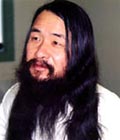As a rule, I'm quite skeptical of supernatural and paranormal phenomena. I don't dismiss that in many instances there is some strange effect at work--personal experience is a great convincer--but I'm steadfast in my belief that the strange and mystical can be explained by
natural forces, with no "super" prefix required. That doesn't mean such forces must be presently known or understood. Cosmology and quantum mechanics show that the more we learn, the more we understand how stunningly little we actually understand about how the universe works.
So you can understand how my interest would be piqued yesterday when I heard an NPR report--part of an ongoing "The Science of Spirituality" series--on
Can Positive Thoughts Help Heal Another Person? One study in particular was striking, because it seemed to imply that couples separated by some distance maintain some sort of undefined "connection" with each other:
As the session begins, Dean Radin, a senior scientist here, watches as a computer shows changes in J.D.'s blood pressure and perspiration. When J.D. sees the image of his wife, the steady lines suddenly jump and become ragged. The question is: Will Teena's nervous system follow suit?
"Notice how here … see, there's a change in the blood volume," says Radin, pointing to a screen charting Teena's measurements. "A sudden change like that is sometimes associated with an orienting response. If you suddenly hear somebody whispering in your ear, and there's nobody around, you have this sense of what? What was that? That's more or less what we're seeing in the physiology."
An hour later, Radin displays Teena's graph, which shows a flat line during the times her husband was not staring at her image, but when her husband began to stare at her, she stopped relaxing and became "aroused" within about two seconds.
After running 36 couples through this test, the researchers found that when one person focused his thoughts on his partner, the partner's blood flow and perspiration dramatically changed within two seconds. The odds of this happening by chance were 1 in 11,000. Three dozen double blind, randomized studies by such institutions as the University of Washington and the University of Edinburgh have reported similar results.
Obviously, Alfred Bester would be tickled by these kinds of studies. Telepathy is, after all, a long-cherished science fiction trope, albeit one that's tolerated despite a lack of substantial scientific credibility. But how then (assuming the results are indeed valid) could science explain such seemingly paranormal double-blind test results? By invoking the decidedly SFnal phrase
quantum entanglement.
Here's how it works. Once two particles have interacted, if you separate them, even by miles, they behave as if they're still connected. So far, this has only been demonstrated on the subatomic level.
But Radin wonders: Could people in close relationships — couples, siblings, parent and child — also be "entangled"? Not just emotionally, and psychologically — but also physically?
"If it is true that entanglement actually persists, by means of which we don't understand," he says, "if they are physically entangled, you should be able to separate them, poke one, and see the other one flinch."
This idea — that we may be connected at some molecular level — echoes the words of mystics down the ages. And it appeals to some scientists.
This is, simply put, amazing stuff. Even though skeptics rightly point out that quantum entanglement as we know it doesn't function in this manner, quantum entanglement is so poorly understood ("Magic to us," as Sir Arthur C. Clark might have said) that there may be undiscovered tangential loopholes that
will allow for effects such as this. And even if quantum entanglement proves a dead end, it at least serves as a valid starting point for future research, until either new avenues of investigation are found or the initial studies are discredited. Whichever come first.
This conflation of the supernatural with quantum physics brings to mind an African missionary who celebrated mass as a visiting priest at my church some years back. Oddly enough, the priest bore more than a passing resemblance to SF author Samuel R. Delany, complete with a thick white beard. He wore one of those black knit cuffy skull caps, and had an enthusiastic personality, literally bubbling over with energy.
When he began his homily, he caught my attention right away by discussing the creation of the universe during the Big Bang "13 billion years ago," and how the evolution of the universe is evidence of God's majesty. Rather than viewing science as an enemy of theology, he embraced it and used it as an ally (which isn't always the case in Texas, as evidenced by recent shenanigans perpetrated by the
Texas State Board of Education). Then he did something I
never expected to hear in church. He invoked
Max Planck:
"All matter originates and exists only by virtue of a force which brings the particles of an atom to vibration and holds this minute solar system of the atom together....We must assume behind this force the existence of a conscious and intelligent mind. The mind is the matrix of all matter." --Max Planck
He finished his homily with a wonderful metaphore. If God is present in the subatomic, quantum physics level of matter (and the point of his arguement is that He is) then we are suffused and awash in God's presence as a fish is awash in water.
The universe is a wondrous thing, be you a theist, atheist or agnostic. Science is the single best tool we have for learning about and understanding this universe (or any other). How anyone, of any particular belief could hold otherwise is, frankly, beyond me.
Besides, it's great fodder for SFnal story ideas. What's the over/under on the first appearance of "Quantum entanglement telepathy" fiction?




































